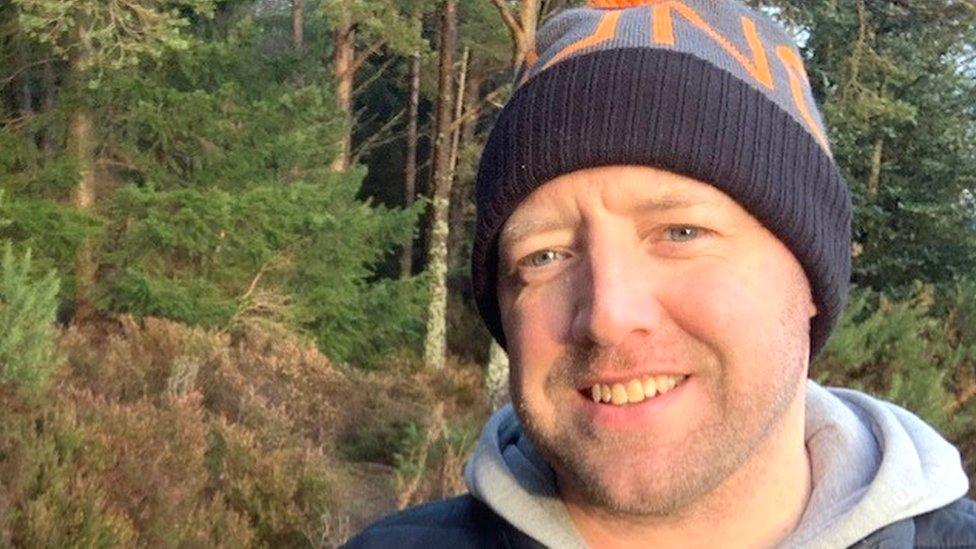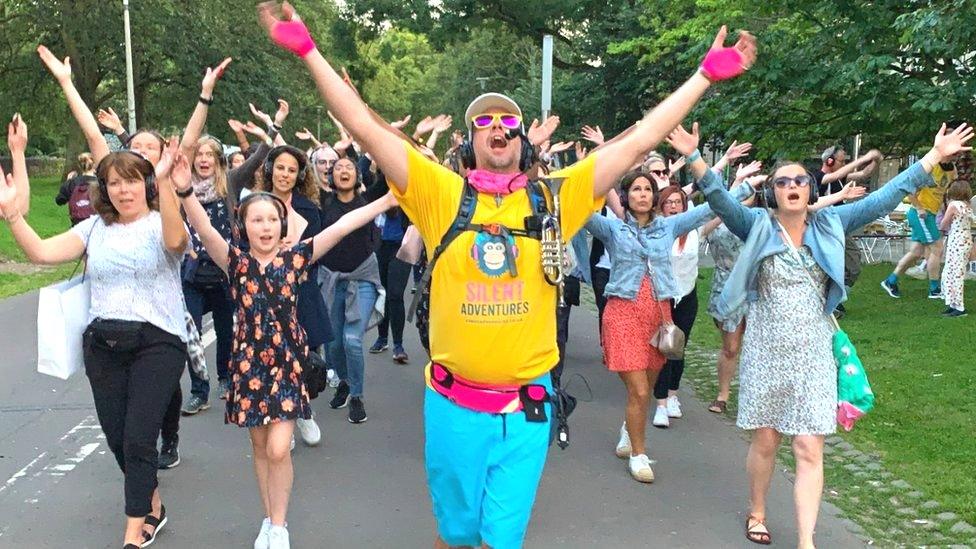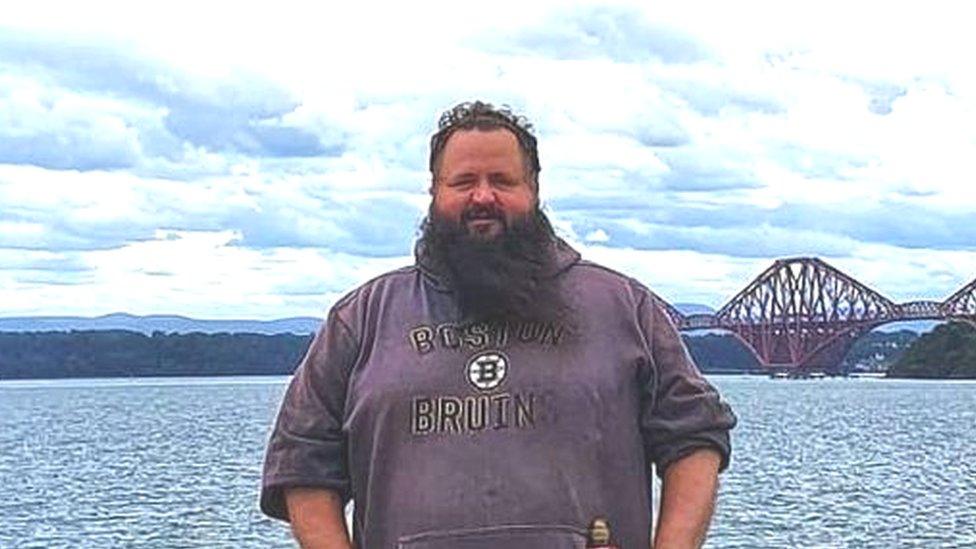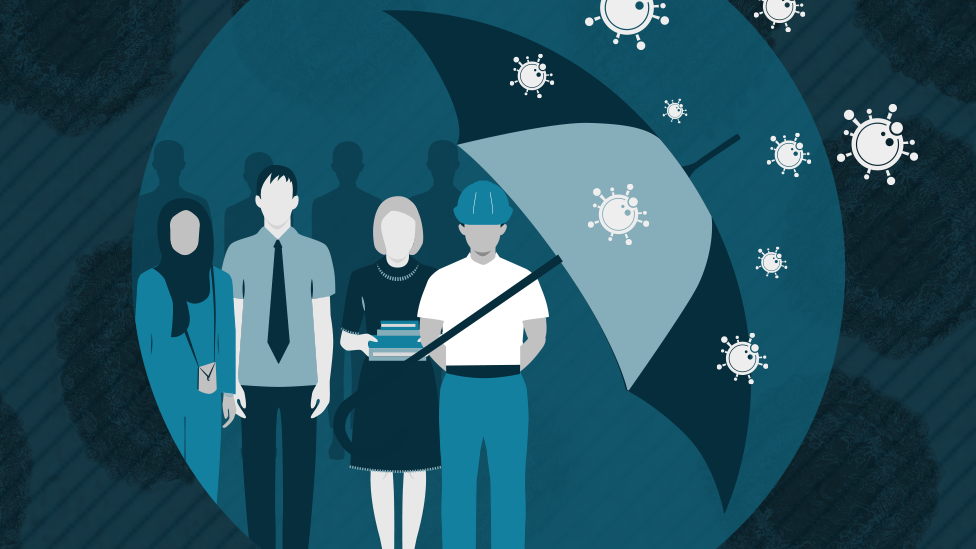Covid in Scotland: 'Going on furlough saved my life'
- Published

Robbie Black says he "wouldn't be here now" if he'd been forced to work during the pandemic
Robbie Black has every reason to be grateful for furlough, the UK government job support programme which draws to a close on Thursday.
The 39-year-old heart-and-lung transplant recipient was working at an Inverness restaurant when the pandemic hit in early 2020.
Severely immuno-suppressed as a result of anti-rejection drugs, he feared for his life. The nature of his work - interacting in close proximity to the public - put him particularly at risk.
But Robbie, who was born with cystic fibrosis and underwent his double transplant in 1999, needed a job to cover his mortgage and household bills. So the UK government's decision to introduce its job retention scheme in March 2020 was a game-changer.
"I'm in the highest risk group and it's entirely possible that if I catch Covid I will die," he explains. "If it hadn't been for furlough, I would have been forced back to work at the height of the pandemic. If I'd had to do that, I wouldn't be here now."

Robbie had a heart and lung transplant when he was a teenager
Until last week, Robbie was becoming increasingly anxious about the end of the furlough scheme and the prospect of having to return to his indoors hospitality job.
But he now has a new future to look forward to, having just accepted a job at a golf driving range.
"The job will be all outside and full-time, so I have decided to leave my role at the restaurant as it's simply not safe enough to go back."
Robbie still regrets the end of furlough, and believes the UK government should have extended the scheme for people who are at greatest risk of becoming severely ill as a result of Covid-19.
"I think it would make sense to extend furlough for people who have been recommended for a third dose of the vaccine rather than a booster," he says.
"This would allow more research to be done into how much protection immuno-suppressed people get from the vaccines. I'm not saying furlough forever. It's more on a case-specific basis."

How did furlough work?
Furlough was introduced across the UK in spring 2020, to try to prevent people being laid off by their employers during lockdown.
The government initially paid 80% of the wages of people who couldn't work, or whose employers could no longer afford to pay them.
From July 2021, the government's contribution was gradually reduced.
According to the think tank Resolution Foundation, the scheme supported 11.6 million employees and cost about £70bn over its 18-month lifespan. About one million people are still expected to be on the scheme at its close.

'I set up a disco business under furlough'

James Longworth says "everyone had a unique experience of the corona-coaster"
For airline pilot James Longworth, being put on furlough in April last year was initially not a laughing matter.
The 44-year-old from Edinburgh says there were some "anxious lows" as uncertainty kicked in over his future.
But his new circumstances were to open up his creative side. He set up an online site called Disco In-Furlough which gave people a once-a-week opportunity to dance with hundreds of others simultaneously as they dealt with the social impact of the pandemic.
"Getting everyone dancing in their living rooms was lifting spirits and giving a weekly focus for all ages," he explains.
It was to prove so successful that it led to a sell-out, live comedy Edinburgh Fringe show in August this year called Silent Adventures which 2,000 people attended.
"I am now delighted to be able to class myself as a professional comedian as well as an airline pilot," he says.

James became a comedy performer during the Fringe
James is looking forward to returning to the skies after furlough ends, as his job has been kept open for him.
"I have missed flying. It is not just the physical act but more the camaraderie of working as a crew and the interaction with the passengers.
"I am not, however, looking forward to the alarm clock going off at 04:00."
Reflecting on his time under furlough, he adds: "Everyone had a unique experience of the corona-coaster and I was no exception.
"There were some anxious lows driven by the general uncertainty for the future, lack of social interaction with friends and the long Scottish winter itself.
"But I will look back on the furlough period grateful that I could unlock some new, more creative skills and share these with the world.
"I can even make my own sourdough bread now."
'Furlough brought comfort to people'

Gavin Harrison says furlough helped to keep him in his job
Mini-coach driver guide Gavin Harrison also has reason to be grateful for the furlough scheme.
As the tourist industry struggled to survive during repeated lockdowns, the Carnoustie-born 36-year-old feared for his job and his future.
The company he works for, Edinburgh-based Rabbie's Tours, looked destined for collapse as the tourist market all but dried up. But furlough allowed the firm to retain most of its staff.
Gavin says the scheme "helped bring something of a comfort" to many like him who were facing financial difficulties and unemployment.
He's also grateful to his employers, who he says kept all staff informed about what was happening.
"I know of other friends in a similar situation who had complete silence from their employers," he explains. "I know of some who immediately had their contracts terminated regardless of years of service and were quite simply thrown on the unemployment scrapheap."
'Strangely enjoyable'
Gavin initially found it "strangely enjoyable" not having to go to work, spending much of his days watching TV and going on long walks. But as time went on, he increasingly realised how much he was missing his job and the "banter" with his colleagues.
Gavin will continue to work for Rabbie's now furlough is over, and is hopeful his company will get through the tourism sector's traditionally leaner winter months.
He adds: "I remain confident that as restrictions are lifted and people are allowed to visit Scotland again, that tourist numbers will continue to rise.
"We as a country are open for business and I have thoroughly enjoyed having people sat behind me on my bus listening to my stories and terrible jokes."
- Published30 September 2021
